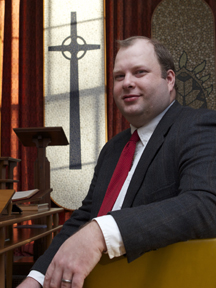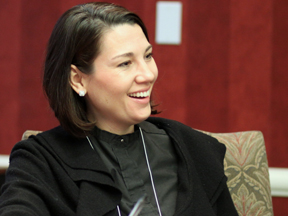Wabash College President Patrick White has announced the appointment of Dr. Derek Nelson as the new director of the Wabash Pastoral Leadership Program. Dr. Nelson, who is a member of the Wabash College Religion Department, succeeds the founding director, Dr. Raymond Williams, and his appointment is effective January 1.
In making the announcement, President White also appointed Reverend Elizabeth “Libby” Manning as the Associate Director of the Program.
Founded in 2007 and funded by Lilly Endowment Inc., the Wabash Pastoral Leadership Program develops mid-career Indiana pastors by engaging them in substantive theological reflection on many complex social issues facing contemporary Christian congregations. It provides a teaching and learning venue for pastoral leaders that has practical significance for their lives and the well-being of the communities they serve.
 “In the nationwide search that brought Derek Nelson back to the Wabash Religion Department, we discovered and appreciated the breadth of his academic, pastoral, and administrative skills,” said Dean of the College Gary A. Phillips. “All three strengths will serve him, the Pastoral Leadership Program, and the College well as the next Director of the Program.”
“In the nationwide search that brought Derek Nelson back to the Wabash Religion Department, we discovered and appreciated the breadth of his academic, pastoral, and administrative skills,” said Dean of the College Gary A. Phillips. “All three strengths will serve him, the Pastoral Leadership Program, and the College well as the next Director of the Program.”
Dr. Nelson earned his bachelor’s degree from Wabash College, his Master of Divinity degree from Yale, and his Ph.D. from the Graduate Theological Union in Berkeley, California. He returned to teach religion at his alma mater in 2012 after serving on the faculty of Thiel College for six years.
“This is a special opportunity for me,” Nelson said. “Raymond Williams, who founded this program, was my teacher when I was a student here. So it means a lot to me that he entrusts me to lead this program, which prepares pastors to be useful, engaged leaders in their communities.”
Dr. Nelson is an historical and systematic theologian with wide-ranging interests in the study of religion and theology. His first two books deal with the doctrine of sin and a third concerns the relationship of religion and narrative theory, particularly in the genre of theological autobiography. He teaches courses in medieval and Reformation Christianity, religion and film, religion and literature, theological ethics, and various topics in Christian theology. Nelson is an ordained Lutheran pastor, and is presently at work on an intellectual biography of the 16th century theologian Martin Luther.
Reverend Manning replaces Verity Jones, who had previously served the program as its Associate Director. Manning serves Christ the Savior Lutheran Church in Fishers, Indiana, where she is the Pastor of Ministry and Maturity. She earned her bachelor’s degree from Davidson College and her Master of Divinity degree from Trinity Lutheran Seminary in Columbus, Ohio. While in seminary, she received the Auer Award as the Outstanding First Year Student and the Goethe Scholarship as the program’s Outstanding Senior Student.
 Reverend Manning is well suited to her work with the Wabash Pastoral Leadership Program since she completed the program a year ago.
Reverend Manning is well suited to her work with the Wabash Pastoral Leadership Program since she completed the program a year ago.
“The camaraderie that develops among the participants sharing in theological reflection with community leaders is remarkable,” Manning said. “This program allows pastors to engage important issues deeply and thoughtfully, and to have this space set aside to think so carefully with such talented, caring people is an incredible opportunity.”
She and Nelson agree that the program prepares pastors to be engaged in adaptive change within their parishes and, importantly, in their communities.
“Participants in this program become better pastors because of their interactions with one another and leaders shaping our communities,” Manning said. “We see the parish beyond the four walls of our churches; we see our churches in a larger context and we are prepared to speak to larger issues. This program changes the role of pastors into one that is bigger, broader, and more exciting.”
Participants in the Wabash Pastoral Leadership Program meet on the Wabash campus 10 times over a two-year period to meet with civic, government, business, and religious leaders to discuss issues that affect local Indiana communities. The pastors learn about a range of topics, such as statewide efforts to strengthen public education, Indiana economic initiatives, government responses to property tax and other issues, the impact of immigration on local communities, and advances in medical research and their impact on health care. In addition, the pastors participate in a study tour in North America during the first year and an international study tour in the second year of the program to learn about transnational contexts.
“Derek is a recognized and respected scholar of Martin Luther and interpreter of the Christian theological tradition; he is a leading voice in the Evangelical Lutheran Community's effort to formulate theological and confessional reflection on criminal justice; and he has recently guided the Thiel College Religion Department and wider community in developing international immersion learning opportunities for students and faculty with the goal of preparing students to engage the world,” added Dean Phillips.
“These rich experiences prepare him especially well to lead the Wabash Pastoral Leadership Program.”
Dr. Nelson said he does not expect significant changes to the program moving forward, but does want to imagine ways to engage the program’s alumni. “We’re trying to think about how to make good use of this network of people who have been what we call ‘Wabash-ed’ — people who have shared this incredible learning and growing experience. We want to find ways in which we can keep them in touch with one another and continue to nurture the relationships that started here.”
Thirty-five pastors representing two cohorts have completed the program thus far, and 16 pastors are currently engaged in the two-year program. The program was established with a $1.5 million grant from Lilly Endowment, and a second $1.57 million grant in 2011 will continue the program through 2016.
Manning praises the program for its rigor and effectiveness. “These pastors experience something that is truly life-changing. This program requires them to forge into territories where they don’t have the answers — sometimes where there are no answers. And there’s a lot of anxiety that goes with that kind of experience because so often we’re called to provide answers to our congregations and communities. But that’s the world we’re living in and this is the kind of leadership we as pastors have chosen to pursue.”
For more information on the program, please visit the program's website.